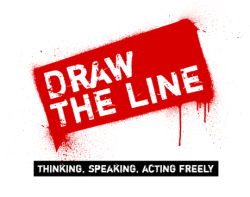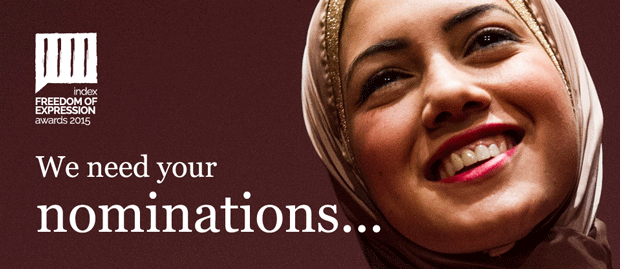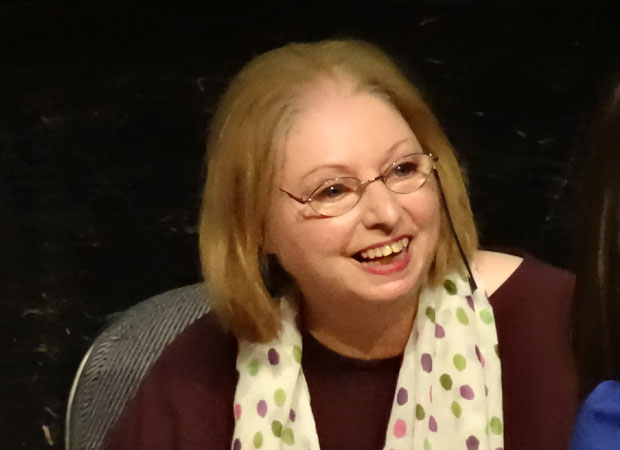16 Oct 2014 | Draw the Line, Youth Board

This month the Index Youth Advisory Board is discussing legal regimes and how they nurture or stifle the free expression of ideas. Examples of draconian laws abound: from Russia’s law banning “homosexual propaganda” to the UK’s use of RIPA legislation to violate the confidentiality of journalists’ sources.
When it comes to free speech: laws, what are they good for?
Legal frameworks protect speech and broader free expression. Take for instance Article 19 of the Universal Declaration of Human Rights which tells us that we all have the right to freedom of opinion and expression. Most of us, I’m sure, would cherish this right – who wouldn’t want to be able to express themselves freely and say what they like without the interference of the state?
In the United Kingdom, Article 10 of the Human Rights Act grants citizens freedom of expression. Most countries have different forms of Article 10. It is these laws – the ones that promote and protect our right to free speech – that form the crucial pillars of any democracy.
But do all laws protect our right to free speech?
Article 10 does a good job of granting us the confidence to speak out and ensure our voices are heard, but do other laws do the same? Or are there laws that, in some way, serve to restrict free speech? The example from Russia underline the use of legislation to restrict the right to expression. The law also curtails the right to assembly, another important part of a democratic society.
When you look into Article 10 itself, you begin to learn about the restrictions of the law and begin to understand how, in many ways, the state still does have authority over our freedom of expression. For example, Article 10 can be restricted “in the interests of national security” and in order to “maintain the authority of the judiciary”.
And what about the countries that don’t have specific laws that promote freedom of expression as strongly as the UK’s Article 10? Many may find it easy to conclude that countries like Iran have more laws that serve to restrict free speech, rather than protect it. It’s interesting to look at blasphemy laws in this instance to examine whether it protects the rights of those who are religious or restricts the rights of those who wish to criticise religion.
This month on Draw the Line, we discuss the impact a country’s laws have on our freedom of expression. Join the discussion and let us know whether laws serve to protect or restrict your right to free speech.
This article was posted on 16 Oct, 2014 at indexoncensorship.org
16 Oct 2014 | News and features, Politics and Society, Religion and Culture, United Kingdom
Thirty years ago this week a bomb exploded in the Grand Hotel, Brighton, where the then prime minister, Margaret Thatcher, and much of her cabinet were staying during Conservative party conference.
The bomb had been planted a month previously by IRA member Patrick Magee, with the intention of assassinating the prime minister. Thatcher escaped, but others did not. Five party members died. Others, including Margaret Tebbit, wife of Thatcher’s rottweiller Norman Tebbit, were left disabled.
The whereabouts of then-32-year old aspiring novelist Hilary Mantel at the time were not known, but we do now know that she herself was thinking about killing Thatcher as the IRA was planning the Grand bombing.
Last week, at the Royal Festival Hall, a solid concrete building that looks as if it could survive the combined explosive attentions of the IRA, Al Qaeda and a reanimated Fred Dibnah, Mantel discussed her own Thatcher assassination plot, which was published this year in the form of a short story that she had started over 3 decades ago.
“People have worked so hard to take offence at this story,” the Wolf Hall author pointed out, adding mischievously, “If only they would go through my extensive back catalogue it would keep them in fury for the rest of their lives.”
Mantel’s assassination fantasy is an enjoyable piece of suburban noir in which an IRA sniper attempts to use a Windsor woman’s window as a hide to take a shot at Thatcher. It’s interesting in that one finds the narrator and the gunman jockeying for position about their right to revile Thatcher as they do: who is more Irish? who is more Northern? Who is more affected by this terrible woman?
But ultimately it’s an almost Tales-Of-The-Unexpectedish story about extraordinary things happening to ordinary people.
Mrs Thatcher’s friend Lord Bell was horrified by Mantel’s story and her subsequent interview in The Guardian, where Mantel described seeing Thatcher leaving the hospital in 1983, saying that “if I wasn’t me, if I was someone else, she’d be dead”. Lord Bell angrily announced: “If somebody admits they want to assassinate somebody, surely the police should investigate. This is in unquestionably bad taste.”
The Daily Mail’s Stephen Glover was equally apoplectic: “Mantel’s contribution is peculiarly damaging because, while she appears so mild-mannered, her message is interpretable as a deadly one. If you don’t like your democratically elected leaders, who operate within the rule of law, you can always think about assassinating them.”
What Bell and Glover both seem to have failed to grasp here is the difference between thinking about something and doing it, or even the difference between thinking about doing something and plotting to do it.
Thinking about doing things one would not normally do is often known as “imagining”, and is quite crucial to the creative process. It’s an essential part of humanity that we can think beyond ourselves. It’s what allows us to empathise and sympathise; we may not be familiar with a specific set of circumstances, but we can, at least in part, imagine what it would be like to be placed in certain circumstances. I have never been homeless, but I can imagine that I wouldn’t like it. I can even imagine what might go through the head of someone I profoundly disagree with.
It was by sheer coincidence that the night before Mantel spoke at the Royal Festival Hall, Salman Rushdie received the PEN Pinter prize at the British Library.
While Mrs Thatcher was still prime minister, Rushdie’s imagination got him into rare trouble when he published the allegedly “blasphemous” Satanic Verses. Whether the allegation of blasphemy was correct or not, is, by the way, irrelevant. That suggestion would not validate the non-publication of a book, and certainly would not justify the murder contract put out by the supreme leader of Iran, Ayatollah Khomeini, in February 1989.
Rushdie’s western critics then often couched their criticisms in terms that emphasised their empathy with the “Muslim anger” which gave rise to protests across the world and eventually the Ayatollah’s incitement to murder; they understood, they implied. They too, had been hurt. Mrs Thatcher herself (characterised as “Mrs Torture” in the book) said: “We have known in our religion people doing things which are deeply offensive to some of us and we have felt it very much.”
The Archbishop of Canterbury, Robert Runcie, commented: “I well understand the devout Muslims’ reaction, wounded by what they hold most dear and would themselves die for.”
No mention of being able to well understand or even imagine what it might be like to be on the end of protests, to see your effigy burned in anger across the world.
In his speech at the British Library, Rushdie described one of the worst aspects of the onslaught against his imaginative work; the need to counteract the ignorant prescriptions of The Satanic Verses by those who wanted to have him censored and worse.
“Once the attack was fully underway,” said Rusdhie, “I felt obliged for a long time to fight back against the creation of that false version of The Satanic Verses by offering counter-explanations of my own. I loathed doing it, and often felt that by offering the almost line by line defence that seemed necessary I was damaging the kind of open, private reading of my novel for which, like every writer, I had hoped.”
After Rushdie spoke, a remarkable speech from International Writer of Courage winner Mazen Darwish was read out. Darwish, founder of the Syrian Centre for Media and Freedom of Expression, is currently in a regime jail in Damascus, faced with charges of “publicicing terrorism”. He somehow managed to smuggle a letter to London.
Addressing Rushdie directly, he offered a startling apology for the inaction of many people in the Middle East at the time of the fatwa, saying their indifference was tantamount to collusion to murder.
Drawing a line between the censorship of 1989 and the rise of the Islamic State in Syria today, Darwish lamented: “What a shame this much blood has had to be spilled for us to realise, finally, that we are digging our own graves when we allow thought to be crushed by accusations of unbelief, calling people infidels, and when we allow opinion to be countered with violence.”
Not, bear in mind, the extrapolations of a north London liberal, but a man in prison who knows acutely the price of standing up for the individual, for empathy, and for free expression. Words to bear in mind the next time we’re tempted to embark on a collective outrage against words and thoughts and imagination itself.
This article was posted on 16 October 2014 at indexoncensorship.org
16 Oct 2014 | News and features, Politics and Society, Russia
Russia’s All-Russian Memorial Society faces closure after the Justice Ministry filed a suit with the country’s Supreme Court late last month.
The Justice Ministry filed its suit on 26 September, though Russian news outlets only publicised the case last week.
Recently, Memorial, a long-time critic of the Kremlin, has tried to gain more information on political prisons and has sought justice for victims of political persecution.
Russian prosecutors first sued for Memorial to register as a “foreign agent” under a law that targets groups that receive grants from abroad. However, the court struck down this request.
The Supreme Court will hold another hearing on 13 November, according to Radio Free Europe.
Updated 31 October. An earlier version of this article incorrectly reported that the International Memorial Society, an Index on Censorship award winner, was the subject of the Kremlin action.
This article was posted on 16 October 2014 and updated on 31 October 2014 at indexoncensorship.org
15 Oct 2014 | Press Releases, Uncategorized

- Awards honour journalists, campaigners and artists fighting censorship globally
- Judges include journalist Mariane Pearl and human rights lawyer Sir Keir Starmer
- Nominate at www.indexoncensorship.org/nominations
Beginning today, nominations for the annual Index on Censorship Freedom of Expression Awards 2015 are open. Now in their 15th year, the awards have honoured some of the world’s most remarkable free expression heroes – from Israeli conductor Daniel Barenboim to Syrian cartoonist Ali Farzat to education activist Malala Yousafzai.
The awards shine a spotlight on individuals fighting to speak out in the most dangerous and difficult of conditions. As Idrak Abbasov, 2012 award winner, said: “In Azerbaijan, telling the truth can cost a journalist their life… For the sake of this right we accept that our lives are in danger, as are the lives of our families. But the goal is worth it, since the right to truth is worth more than a life without truth.” Pakistani internet rights campaigner Shahzad Ahmad, a 2014 award winner, said the awards “illustrate to our government and our fellow citizens that the world is watching”.
Index invites the public, NGOs, and media organisations to nominate anyone they believe deserves to be part of this impressive peer group: a hall of fame of those who are at the forefront of tackling censorship. There are four categories of award: Campaigner (sponsored by Doughty Street Chambers); Digital Activism (sponsored by Google); Journalism (sponsored by The Guardian), and the Arts. Nominations can be made online via http://www.indexoncensorship.org/nominations
Winners will be flown to London for the ceremony, which takes place at The Barbican on March 18 2015. In addition, to mark the 15th anniversary of the Freedom of Expression awards, Index is inaugurating an Awards Fellowship to extend the benefits of the award. The fellowship will be open to all winners and will offer training and support to amplify their work for free expression. Fellows will become part of a world-class network of campaigners, activists and artists sharing best practice on tackling censorship threats internationally.
Jodie Ginsberg, CEO of Index, said: “The Index Freedom of Expression Awards is a chance for those whom others try to silence to have their voices heard. I encourage everyone, no matter where they are in the world, to nominate a free expression hero.”
The 2015 awards shortlist will be announced on January 27th 2015. Judges include journalist Mariane Pearl and human rights lawyer Sir Keir Starmer. The public will be asked to participate in selecting the winner of the Google Digital Activism award through a public vote beginning January 27th 2015. Sir Keir said: “Freedom of expression is part of the bedrock of civilised, democratic society. The Index on Censorship Awards have a material influence on promoting such freedom and both celebrating and protecting those who fight against censorship worldwide. That’s why Doughty Street Chambers chooses Index as its principal charity.”
For more information please contact David Heinemann: [email protected]
_______________________________________________________________________
NOTES FOR EDITORS
About Index on Censorship:
Index on Censorship is an international organisation that promotes and defends the right to freedom of expression. The inspiration of poet Stephen Spender, Index was founded in 1972 to publish the untold stories of dissidents behind the Iron Curtain and beyond. Today, we fight for free speech around the world, challenging censorship whenever and wherever it occurs. Index believes that free expression is the foundation of a free society and endorses Article 19 of the Universal Declaration of Human Rights, which states: “Everyone has the right to freedom of opinion and expression.”
About The Index on Censorship Freedom of Expression Awards:
The Index Freedom of Expression Awards recognise those deemed to be making the greatest impact in tackling censorship in their chosen area.
Awards categories:
Journalism – for impactful, original, unwavering journalism across all media (sponsored by The Guardian).
Campaigner – for campaigners and activists who have fought censorship and who challenge political repression (sponsored by Doughty St Chambers).
Digital Activism – for innovative uses of new technology to circumvent censorship and foster debate (sponsored by Google).
Arts – for artists and producers whose work asserts artistic freedom and battles repression and injustice.
Previous award winners include:
Journalism: Azadliq (Azerbaijan), Kostas Vaxevanis (Greece), Idrak Abbasov (Azerbaijan), Ibrahim Eissa (Egypt), Radio La Voz (Peru), Sunday Leader (Sri Lanka), Arat Dink (Turkey), Kareen Amer (Egypt), Sihem Bensedrine (Tunisia), Sumi Khan (Bangladesh), Fergal Keane (Ireland), Anna Politkovskaya (Russia), Mashallah Shamsolvaezin (Iran)
Digital/New Media: Bassel Khartabil (Palestine/Syria), Freedom Fone (Zimbabwe), Nawaat (Tunisia), Twitter (USA), Psiphon (Canada), Centre4ConstitutionalRights (US), Wikileaks
Advocacy: Malala Yousafzai (Pakistan), Nabeel Rajab (Bahrain), Gao Zhisheng (China), Heather Brooke (UK), Malik Imtiaz Sarwar (Malaysia), U.Gambira (Burma), Siphiwe Hlope (Swaziland), Beatrice Mtetwa (Zimbabwe), Hashem Aghajari (Iran)
Arts: Zanele Muholi (South Africa), Ali Farzat (Syria), MF Husain (India), Yael Lerer/Andalus Publishing House (Israel), Sanar Yurdatapan (Turkey)
You have received this email because email address ‘[email protected]’ is subscribed to ‘AWARDS 2015 Call For Nominations’.



